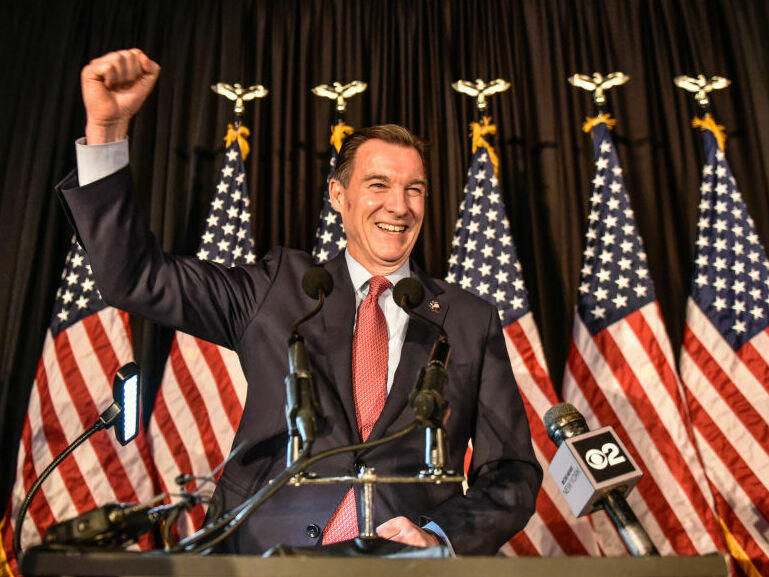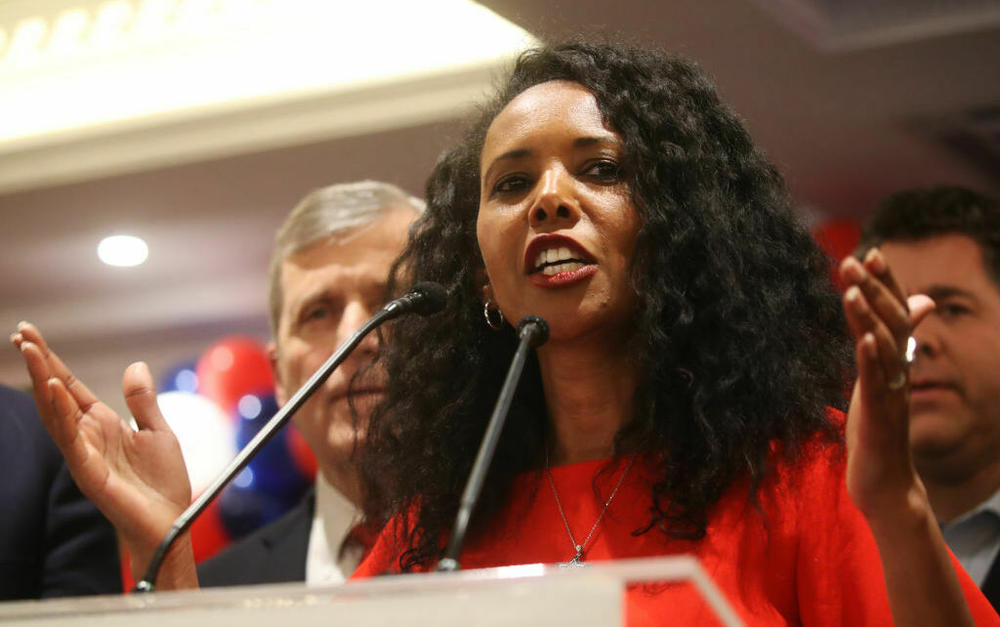Section Branding
Header Content
5 takeaways from Democrats flipping George Santos' House seat in New York
Primary Content
Republicans were hoping concerns over immigration would put them over the top Tuesday in a closely watched special election in suburban New York to replace the disgraced former Rep. George Santos.
Instead, Democrats parried the attacks and flipped the seat.
Democrats also retained control of the state House in Pennsylvania, holding onto a seat in the Philadelphia suburbs, where the winning candidate campaigned, in part, on abortion rights.
Both areas lean Democratic, but Republicans were hoping to make inroads. Instead, they're left still trying to find a winning message in the suburbs — and now have an even slimmer House majority in Washington.
Special elections are low-turnout affairs and don't always indicate what will happen in future elections, but there were some important consequences and lessons to draw out of Tuesday's results:
1. Republicans' historically narrow majority got even smaller.
What gets thinner than a whisker? That's essentially Republicans' current majority in the House — only three seats. You think governing has been hard for House Republicans? It just got that much harder.
2. Republicans continue to struggle in the suburbs.
Education, crime and now immigration. None of those issues has really turned the tide for Republicans in the suburbs. With former President Donald Trump as the likely standard bearer again for the party, their job is made even harder. The latest NPR/PBS NewsHour/Marist poll found that almost two-thirds of suburban voters have an unfavorable opinion of Trump and, in a head-to-head matchup, Biden leads Trump by 16 points with suburban voters.
If the GOP can't get the message — and the messengers — right, it could prove difficult for them to expand their majority in the House come November as many swing districts are in suburban areas.
3. Democrats showed they can defend themselves on immigration.
This race was dominated by GOP attacks on immigration. Republicans spent more than $8 million on campaign ads in this race, a huge number for a special congressional election. They hammered Democrat Tom Suozzi on immigration on the airwaves. Republican Mazi Pilip even held rallies near a makeshift tent city in Queens that houses migrants.
It's been a hot-button issue in New York with red-state governors busing migrants who crossed the border illegally to cities run by Democrats, including New York. New York Mayor Eric Adams has criticized the Biden administration on border security, calling on it to do more. Biden gets just a 29% approval for his handling of the issue, and Republicans have a 12-point advantage on which party would do a better job with it, according to the latest NPR poll.
So it's understandable that Republicans would want to try to use it. But Democrats showed they can defend themselves on this issue – by tacking to the middle. Suozzi said the border needed to be secured, called for a bipartisan compromise and supported the bipartisan congressional deal that was scuttled by Trump and the hard right. Pilip came out against the bill.
Loading...
4. Abortion rights continue to be something Democrats will run on — with good reason.
In addition to immigration, abortion rights — once again — played a role in Democrats' messaging. Abortion rights and Pilip's ethical record were the main on-air messages that voters saw. Democrats used Pilip saying she is "pro life" and accused her of "running on a platform to ban abortion. No exceptions for rape or incest."
In Pennsylvania, Jim Prokopiak helped Democrats hold onto the Senate with his victory for the legislative seat in Bucks County. And in a statement after his win, he noted the role abortion rights played.
"What I heard from voters is that Bucks County residents need help supporting their families, want control over their own bodies, and ensure they have the ability to chart their own paths in life," he said.
You don't want to read too much into special elections, but it's been special after special after special that Democrats have won since the Dobbs ruling overturned the guaranteed right to an abortion nearly two years ago.
5. Candidates — and money — do matter.
Democrats hammered Pilip's ethics, likening her to Santos. Over Santos' face, this widely run ad begins: "Same story. New name." It then shows Pilip and says she's "about to embarrass us again" and goes on to drop the oppo file about "unpaid bills from her family's business" and that she "also owed more than $100,000 in unpaid taxes to the IRS, even filing a false financial disclosure. ... She's an ethical nightmare."
Suozzi is a known quantity on Long Island. He's a former Nassau County executive and is a former congressman. Democrats essentially billed the race as a moderate, adult in the room vs. an extremist, MAGA candidate.
Sound familiar?
Democrats also outspent Republicans $14 million to $8 million in this race, a massive sum for a special election. In Pennsylvania, the Democratic Legislative Campaign Committee (or DLCC) spent $50,000 to try and hold the state House in Pennsylvania.
That doesn't sound like a lot compared to what was spent in New York, but a little can go a long way in a statehouse race. The DLCC is pledging to spend $60 million in 2024 on statehouse races across the country, the most it ever has.
Money, paired with the right candidates, is usually a recipe for success in politics.


